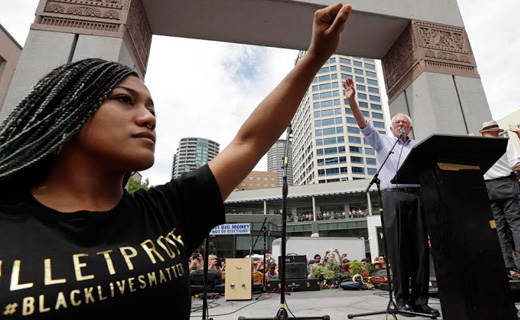
Is Bernie Sanders’ greatest weakness his campaign’s limited addressing of race? Or is he being unfairly targeted for taking on economic injustice – an issue that racial justice activists ought to get behind? In fact, this controversy over Sanders’ perceived lack of attention to the issue of racial justice is more complicated than “class first or race first”. Settled institutions of economic power were built through the exploitation of immigrants, African-Americans, and women. Because of this, these groups’ voices are critical to a policy agenda that claims to solve poverty and inequality. But what are those voices saying?
With the Iowa caucus fast approaching, Democratic candidates Vermont Sen. Bernie Sanders and former Secretary of State Hillary Clinton have each come under intense pressure to show that their candidacy is the most likely to triumph over the Republican presidential nominee. The Sanders campaign has been steadily gaining momentum, but has not been immune to its share of public criticism. That seems to be intensifying as the fight for Iowa draws near. Sanders has continued to come under fire for his perceived weakness on issues dealing with systemic racism.
Then again, our attention to the issue of systemic racism should not be limited to whether or not the Sanders campaign is addressing it. Whoever is the next Democratic party nominee (or for that matter, the next President) will have to deal with injustices tied to race, gender, and sexual identity and orientation not as back burner topics, but at the forefront of their agenda–along with economic and class politics. We’ve seen the beginning of these struggles coming together through the Fight for $15 and the Movement for Black Lives (#BlackLivesMatter).
Nonetheless Sanders’ perceived reticence around race may threaten his campaign. The African-American turnout in voting has been rising steadily since 2000. By percentage, African-American turnout exceeded that of whites by two points in 2012, 66 percent to 64. This is coupled with the consistent rise in voter turnout of the Latino community.
If Sanders’ campaign aims to be “of the people,” then it can be argued that his campaign should first address extensively the most oppressed among us. Systemic racism is an issue that many voters of color face on a daily basis, and if Sanders is to win over a majority of them, his campaign can’t afford to ignore, or be coy, about an issue that these voters don’t have a choice but to face every day of their lives.
Critics vs. supporters
The most recent controversy over the Sanders campaign erupted last week when journalist and author Ta-Nehisi Coates asked the Vermont Senator if he supported reparations for African-Americans. Sanders’ reply was that he was not in favor of reparations and that its likelihood of getting through Congress was nil. The Senator suggested that reparations would be divisive and added:
“…[W]hat we should be talking about is making massive investments in rebuilding our cities, in creating millions of decent paying jobs, in making public colleges and universities tuition-free, basically targeting our federal resources to the areas where it is needed the most and where it is needed the most is in impoverished communities, often African-American and Latino.”
As Coates points out, there is irony in a self-proclaimed “revolutionary” candidate shying away from endorsing a policy that would help a disadvantaged group because it may be “divisive”. Although Sanders makes a compelling argument for economic justice that would also benefit African-Americans and Latinos, he seems to quickly dismiss a topic that is seen as very important to the African-American community by simply stating it is impossible to get through Congress. This is despite the fact that his campaign, as others such as Coates and Kathleen Geier of The Nation have pointed out, is one that stands on many demands and proposals that may be just as “impossible” to get through a Republican-majority Congress as reparations would be.
Or is it that Sanders is leading with a “class first” mentality, one that holds that racism will be eradicated once economic justice is achieved? Is this a faulty way of going about dealing with the issue of systemic racism?
Coates argues that the “class first” approach is one that relies on the myth that racism can not exist within socialism. He explains that raising wages and bettering the economy will not, by default, cure racial injustice. That it will not address the wage gaps between blacks and whites, or housing discrimination based on race, and other ills of capitalism that target marginalized groups specifically. He asks: if Sanders’ campaign is about visionary revolutionary change, why not include the fight for reparations?
Supporters of Sanders have replied directly to Coates’ criticisms. Celebrity and avid Sanders supporter, Michael Render (Killer Mike), took to Twitter to respond to Coates when the controversy broke. Render asserted that it was a shame that African-Americans needed to even make a case for reparations, but that it was unfair to target just Sanders when the other candidates, such as Clinton, have also come out against reparations. Render went further to add that he encouraged “other blacks that are concerned with our poor, working class & middle class to vote Sanders.” But does his encouragement hold weight when looking at Sanders’ platform?
Is Sanders’ economic platform enough?
Some would argue that the Sanders campaign, in addressing economic injustice, is actually addressing racial injustice, and does not treat systemic racism as an afterthought.
Adolph Reed, an author and professor of political science at the University of Pennsylvania, noted in a recent interview on Behind the News with Doug Henwood: “You can go down Sanders’s platform issue by issue and ask, “so how is this not a black issue?” How is a $15 minimum wage not a black issue? How is massive public works employment not a black issue? How is free public college higher education not a black issue? The criminal justice stuff and all the rest of it… [T]he only way we’re going to be able to make anyone’s life better is to change the terms of political debate. And we can only do that on the basis of common experience and the most broadly shared experience is that of those who work for a living or are expected to work for a living.”
Anoa Changa, an Atlanta based attorney, and one of the organizers of African-Americans for Bernie, spoke with People’s World about the scrutiny the Sanders campaign is getting from activists. Changa stated that the economic injustice Sanders wants to dismantle is connected to the black struggle for equality. She expressed that, although the fight for raising the wage to $15 an hour and expanding union rights was not enough to deal with racism, African-Americans are “disproportionately affected when the economy is bad”. Changasaidthat a deeper conversation on race needs to happen–not just within the Sanders campaign, but the whole movement.
“The criticism shouldn’t be treated as an academic exercise,” Changa argued. “This is larger. It needs to be a more balanced conversation. [We need to] discuss race in democratic politics. Black votes need to be seen as more than just a bloc to be coveted by candidates.”
The need to build power
Others, such as Moumita Ahmed, would argue that the weight of dealing with race in relation to the system should not rest solely on Sanders’ campaign. Ahmed, a national organizer for Millennials for Bernie, and supporter of Black Lives Matter, spoke with People’s World. She said she felt that the Coates’ article was a bad analysis of the Sanders campaign, and that although she felt he had a right to be critical, he was unfairly targeting Bernie.
Ahmed asserted that “race analysis and class analysis go hand in hand,” and that Sanders isn’t someone that plays “identitarian politics,” but pushes politics that will benefit everyone. She concluded that the ultimate power doesn’t lie in any one candidate, but with the people, “Grassroots push for change. When the grassroots push them [the candidates] they listen.”
Changa expressed similar sentiments, noting, “At some point, for sustainable change to take root we will have to be involved in the political process at the local and state levels, as well as national politics.”
Changa makes an important point that the movement has to demonstrate power in a wide array of sectors that goes beyond questioning racial justice in academia and demonstrations in the streets.
Left-wing hip-hop artist and author Boots Riley explained in a recent interview on Democracy Now that there needs to be an understanding that at the base of this system is the exploitation of labor, and that it is up to activists to push that point. He asserted that “radicals have to organize a new labor movement, a new radical, militant labor movement that withholds labor and breaks the (anti-union) Taft-Hartley laws in order to do that. This will give social movements teeth.”
No saviors
Activists’ close look at the Sanders’ platform has opened a dialogue on a topic that can often get pushed aside on the left: how to address the fact that there can be no true economic justice without an acknowledgment that much of this system is built upon racial and gender oppression.
Intersectionality, (the idea that racism, sexism, classism, etc. are interconnected and cannot be examined separately from one another), is a concept that many on the left and any Democratic presidential hopeful should get familiar with. There are battles in progress (for example, the current court battle around affirmative action) that can serve as a starting point for politicians to begin to address racial disparities, but there is a long way to go. The burden cannot rest on one candidate alone.
AnoaChanga perhaps summarized it best: “People assume [grassroots supporters] want a savior, or someone to save us. I don’t see Bernie as my savior. We are looking for a leader. [There] needs to be a course correction.”
Photo: Eliane Thompson/AP












Comments